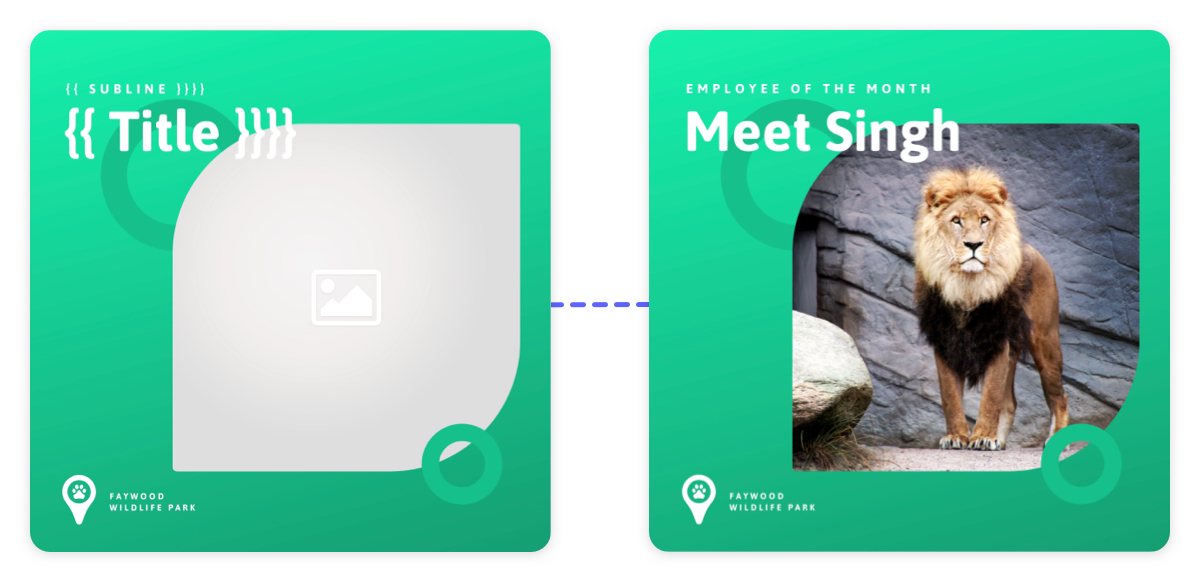Automate Image Generation
The Placid Image Automation API enables template-based, deterministic image generation from structured data. Use our headless infrastructure to render consistent image variations at scale.
To generate an image with the Placid REST API:
- Create an API project or add the API integration to your project in Placid
- Create and design your template
- Send your data and customizations to the API
- Poll the GET endpoint for status updates or use a webhook to get the generated image
{info} 1 image = 1 credit
for canvas sizes up to 4000 px. Switch to test mode for free watermarked previews!
Example Call

// - POST to endpoint `https://api.placid.app/api/rest/images`)
{
...
"template_uuid": "ospo24ysn",
"layers": {
"img": {
"image": "https://faywoodwildlife.com/images/lion-singh.jpg"
},
"subline": {
"text": "Employee of the month"
},
"title": {
"text": "Meet Singh"
}
},
...
// Options for filename, size modifications, export,..
}
The image object
Properties
{
"id": 1,
"status": "queued",
"image_url": null,
"polling_url": null
}| Field | Values |
|---|---|
id |
Unique image id for internal reference |
status |
queued The request has been put into the queue. finished The image has been created successfully. error There was an error. |
image_url |
URL to created image or null |
polling_url |
Endpoint that you can GET poll for status updates |
Create an image
Create a new image by using the following endpoint and request structure:
Endpoint
| Method | URI |
|---|---|
| POST | https://api.placid.app/api/rest/images |
{
"template_uuid": "{template_uuid}",
"webhook_success": "https://webhook.url",
"create_now": false,
"passthrough": null,
"errors": [],
"layers": {
"img": {
"image": "https://imageurl.jpg"
},
"subtitle": {
"hide": true
},
"title": {
"text": "Lorem Ipsum"
}
...
},
"modifications": {
"width": "<width>",
"height": "<height>",
"filename": "<filename>"
},
"transfer": {
"to": "s3",
"key": "<your key>",
"secret": "<your secret>",
"region": "<region name>",
"bucket": "<bucket name>",
"visibility": "public",
"path": "images/image.jpg",
"endpoint": "https://exampleendpoint.com",
"token": "<your sts token>" // optional
}
}
| Field | Values | Description |
|---|---|---|
template_uuid |
Template UUID | Template UUID to be used for image creation |
webhook_success |
Webhook URL | After the image is created Placid will POST the response to this Webhook URL |
create_now |
true or false |
Process the image instantly instead of queueing it. This might fail if your worker is too busy or if you start too many simultaneous requests (check the rate limit) |
passthrough |
string or array |
Any data added to this parameter will be saved and sent in any subsequent webhooks and requests for this image (max-length is 1024 characters) |
layers |
Dynamically change the content and properties of your image layers | |
transfer |
Additionally transfer the generated image to your storage |
Image content
The content of your image will be defined by the data in the layers object. See layer properties for possible modifications.
Export / transfer
To transfer the generated image to your storage use the transfer object.
| Field | Values |
|---|---|
transfer.to |
s3 |
transfer.key, transfer.secret |
Your credentials (Placid never stores them) |
transfer.bucket |
Your bucket name |
transfer.visibility |
public or private |
transfer.path |
File path (Define the full image path starting from the root directory of your bucket, including filename and file extension. Placid will overwrite existing files in the specified directory!) |
transfer.token |
(optional) AWS STS token |
File modifications
To modify the generated image use the modifications object.
| Field | Values |
|---|---|
modifications.width |
Image width Aspect ratio of template will always be kept to fit into your modifications |
modifications.height |
Image height Aspect ratio of template will always be kept to fit into your modifications |
modifications.filename |
Filename for the generated image |
modifications.image_format |
Specify the output image format. Allowed values: auto (default; Dynamically selects jpg or png based on canvas transparency), jpg, png, webp |
modifications.dpi |
Define the output DPI of the PDF. Allowed values are 72(default), 150, 300 |
modifications.color_mode |
Set to rgb (default) or cmyk |
Retrieve an image
This endpoint allows you to retrieve an image by providing its unique id. Refer to the object at the top of this page to see which properties are included with image objects.
Endpoint
| Method | URI |
|---|---|
| GET | https://api.placid.app/api/rest/images/{id} |
Delete an image
This endpoint allows you to delete an image by providing its unique id. Once deleted, the image cannot be retrieved or used.
Endpoint
| Method | URI |
|---|---|
| DELETE | https://api.placid.app/api/rest/images/{id} |
Response
- Success: On successful deletion, the API will return a
204 No Contentstatus code. - Not Found: If the image with the specified
iddoes not exist, the API will return a404 Not Founderror.
